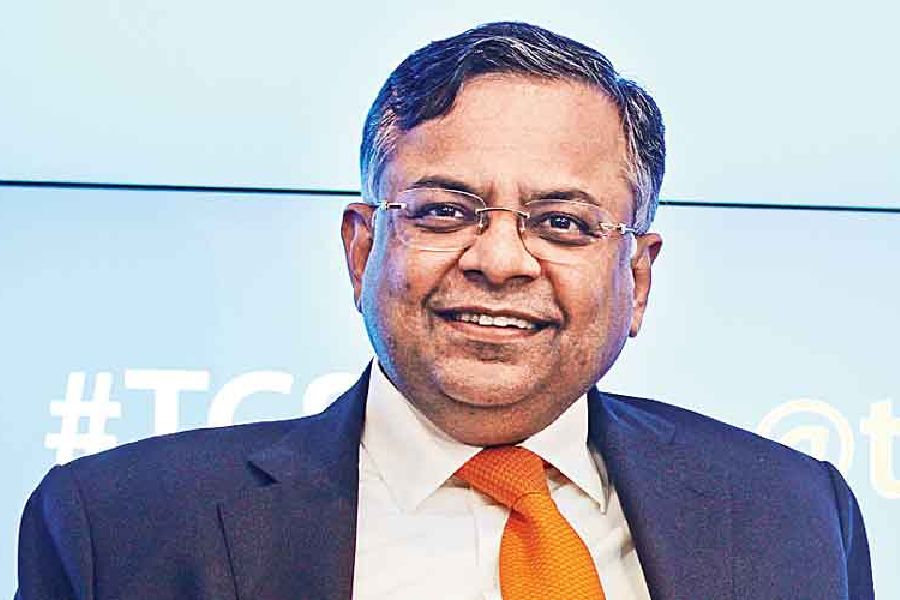All the global transitions are working in India's favour, giving it the potential to become a force in today's uncertain world, but one of the country's biggest challenges is inclusive growth, Tata Sons Chairman N Chandrasekaran said on Monday.
In his address at the JRD Tata Oration, the head of the Tata group also asserted that Artificial Intelligence (AI) is here to stay and it will be beneficial if India prepares for it.
Post the cold war era of relative stability and prosperity, the world appears to have given way to unpredictable conflicts and economic uncertainty, he said, adding that the pandemic resulted in supply chain shocks of gigantic proportion.
"There was an economic slowdown, especially in developed markets. Things seemed to have stabilised, but now we are in the midst of two ongoing wars and there is an ongoing US-China trade stand-off," Chandrasekaran noted.
He said there are also some very important global transitions underway, especially in the areas of AI, energy and global supply chains.
"All these transitions present opportunities for growth, for innovation and for inventing a new future better than the past for all...In this context, India is making significant progress. Economically, we are already the fifth largest economy. Many things are working for us and going in our favour," he asserted.
Citing India's strong macro stability, a healthy banking system, rising share of exports, new capex cycle led by both private and public sectors, rising consumption, and one of the best public digital infrastructure, Chandrasekaran said, "All the global transitions are working in India's favour." Further, he said, "We have the potential to become a global force, especially in the context of today's uncertain world." However, he said, "...at the same time, we have a number of challenges. Our per capita GDP is 60 per cent lower than the global median. Variance in income per capita across states is vast." Pointing out that women comprise just 37 per cent of the total labour force and receive 35 per cent less wages than their male counterparts for the same work, he said, "Inclusion and 'Inclusive Growth' have been our biggest challenge. We need to ensure access to basic education and healthcare for all." Chandrasekaran also said, "On one hand we have a large pool of highly skilled people, on the other hand, we have a large number of unskilled people. There is a wide variance in education outcomes across India's states." He stressed the need to develop skill-based secondary and tertiary education with dual approaches of both classroom and industry-based learning and internships.
"We must ensure that every girl child also gets an equal opportunity like boys irrespective of where they come from," he added.
On harnessing the power of India's youth, Chandrasekaran said, "First, we have to realise that all social transformations will require economic transformation. You cannot sustain a social transformation without an economic transformation. The basic fact is that we need a vibrant environment of job creation to sustain economic upliftment." The Tata Sons chairman said that with the help of this economic growth, "we need to address the inclusion challenge. It has been so for several decades. But we have an opportunity to address it now".
"We need to disproportionately invest in education, healthcare and skilling. Given our size, population scale and disparities, we cannot address all the gaps adequately by traditional methods only," he asserted.
On AI, he said it will impact almost every sector and country going forward. It will not only improve productivity but will also create things which were hitherto not seen or imagined.
"There are extreme views on AI. Those who believe it will change the world for the better and those who believe the risks are very high & it will take a significant number of jobs away. There are merits in these arguments but I for one believe that it will be beneficial if we prepare for it," he added.
Chandrasekaran also pointed out that the energy requirement of the fast-changing world is enormous.
For example, he said more AI means more data centres, which means more energy. By 2027, global AI-related electricity consumption could surge by 85 to 134 TWh (Terawatt Hour) annually, comparable to the power needs of countries like the Netherlands, Argentina, and Sweden.
"We need to meet this energy requirement with a lower cost of energy and it all has to be new energy. Apart from the new energy sources of solar and wind, there will be at least 20 other new energy sources that will come up in the next two decades," he said, adding that all of this would require significant investment, capabilities, and new skills which in turn would generate new jobs.
On global supply chains, he said over the last four decades, global supply chains have been built for efficiency and have been concentrated and the pandemic as well as the geo-political uncertainties have exposed the fragility of this approach.
"Now, alternative supply chains, to ensure redundancy and continuous operations, are being built," Chandrasekaran said.
Except for the headline, this story has not been edited by The Telegraph Online staff and has been published from a syndicated feed.











